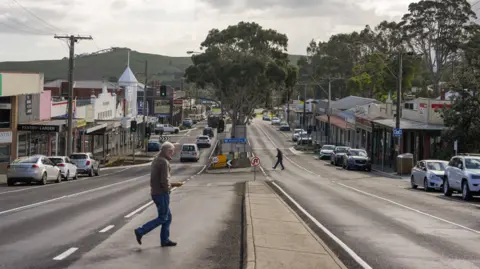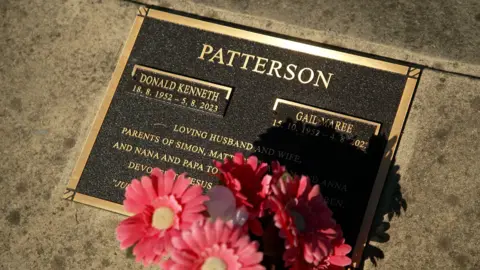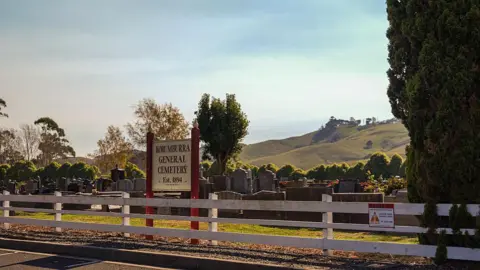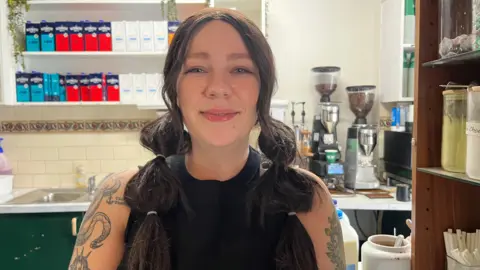'Everyone knows somebody affected': The small towns in shock after mushroom murders
The winters in Victoria's Gippsland region are known for being chilly. Frost is a frequent visitor overnight, and the days are often overcast.
But in the small town of Korumburra - a part of Australia surrounded by low, rolling hills - it's not just the weather that's gloomy; the mood here is plainly subdued.
Korumburra is where all of Erin Patterson's victims made their home. Don and Gail Patterson, her in-laws, had lived there since 1984. They brought up their four children in the town of 5,000. Gail's sister Heather Wilkinson lived nearby - her husband Ian was the pastor at the local Baptist church.
The four were invited to Erin's house on 29 July 2023 for a family lunch that only Ian would survive, after a liver transplant and weeks in an induced coma.
And on Monday a jury rejected Erin's claim she accidentally served her guests toxic mushrooms, finding her guilty of three counts of murder and one of attempted murder.
Her 10-week trial caused a massive stir globally, but here in Korumburra they don't want to talk about it. They just want to return to their lives after what has been a difficult two years.
"It's not an easy thing to go through a grieving process... and it's particularly not easy when there's been so much attention," cattle farmer and councillor for the shire Nathan Hersey told the BBC.
"There's an opportunity now for a lot of people to be able to have some closure."
 Reuters
ReutersThe locals are fiercely loyal - he's one of the few people who is willing to explain what this ordeal has meant for the many in the region.
"It's the sort of place that you can be embraced in very quickly and made to feel you are part of it," he explains.
And those who died clearly helped build that environment.
Pretty much everyone of a certain generation in town was taught by former school teacher Don Patterson: "You'll hear a lot of people talk very fondly of Don, about the impact he had on them.
"He was a great teacher and a really engaging person as well."
And Mr Hersey says he has heard many, many tales of Heather and Gail's generosity and kindness.
Pinned to the Korumburra Baptist Church noticeboard is a short statement paying tribute to the trio, who were "very special people who loved God and loved to bless others".
"We all greatly miss Heather, Don and Gail whether we were friends for a short time or over 20 years," it read.
It's not just Korumburra that's been changed by the tragedy though.

This part of rural Victoria is dotted with small towns and hamlets, which may at first appear quite isolated.
The reality is they are held together by close ties - ties which this case has rattled.
In nearby Outtrim, the residents of Neilson Street – an unassuming gravel road host to a handful of houses – have been left reeling by the prosecution claim their gardens may have produced the murder weapon.
It was one of two locations where death cap mushrooms were sighted and posted on iNaturalist, a citizen science website. Pointing to cell phone tracking data, the prosecution alleged that Erin Patterson went to both to forage for the lethal fungi.
"Everyone knows somebody who has been affected by this case," Ian Thoms tells the BBC from his small farm on Nielson Street.
He rattles off his list. His son is a police detective. His wife works with the daughter of the only survivor Ian. His neighbour is good friends with "Funky Tom", the renowned mushroom expert called upon by the prosecution – who coincidentally was also the person who had posted the sighting of the fungi here.
Down the road another 15 minutes is Leongatha, where Erin Patterson's home sits among other sprawling properties on an unpaved lane.
She bought a plot of land here with a generous inheritance from her mother and built the house assuming she would live here forever.
It has been sitting empty for about 18 months, a sign on the gate telling trespassers to keep out. A neighbour's sheep intermittently drop by to mow the grass.
 Getty Images
Getty ImagesThis week, the livestock was gone, and a black tarpaulin had been erected around the carport and the entrance to her house.
There's a sense of intrigue among some of the neighbours, but there's also a lot of weariness. Every day there are gawkers driving down the lane to see the place where the tragic meal happened. One neighbour even reckons she saw a tour bus trundle past the house.
"When you live in a local town you know names - it's been interesting to follow," says Emma Buckland, who stops to talk to us in the main street.
"It's bizarre," says her mother Gabrielle Stefani. "Nothing like that has [ever] happened so it's almost hard to believe."
The conversation turns to mushroom foraging.
"We grew up on the farm. Even on the front lawn there's always mushrooms and you know which ones you can and can't eat," says Ms Buckland. "That's something you've grown up knowing."
The town that's felt the impact of the case the most in recent months, though, is Morwell; the administrative capital of the City of Latrobe and where the trial has been heard.
"We've seen Morwell, which is usually a pretty sleepy town, come to life," says local journalist Liam Durkin, sitting on a wall in front of Latrobe Valley courthouse.
He edits the weekly Latrobe Valley Express newspaper, whose offices are just around the corner.
"I never thought I'd be listening to fungi experts and the like for weeks on end but here we are," he says.
"I don't think there's ever been anything like this, and they may well never be in Morwell ever again."
While not remote by Australian standards, Morwell is still a two-hour drive from the country's second largest city, Melbourne. It feels far removed from the Victorian capital – and often forgotten.
Just a few months before that fateful lunch served up by Erin Patterson in July 2023, Morwell's paper mill - Australia's last manufacturer of white paper and the provider of many local jobs - shut down. Before that, many more people lost their jobs when a nearby power station closed down.
Older people here have struggled to find work; others have left to find more lucrative options in states like Queensland.
So locals say being thrust in the spotlight now is a bit bizarre.

In Jay Dees coffee shop, opposite the police station and the court, Laura Heller explains that she normally makes about 150 coffees a day. Recently it's almost double that.
"There's been a lot of mixed feelings about [the trial]," she says.
There's been a massive uptick for many businesses, but this case has also revived long-held division in the community when it comes to the police and justice systems, she explains.
"This town is affected by crime a lot, but it's a very different type of crime," Ms Heller says, mentioning drugs and youth offending as examples.
"Half the community don't really have much faith in the police force and our magistrates."
Back in Korumburra, what has been shaken is their faith in humanity. It feels like many people around the globe have lost sight of the fact that this headline-making, meme-generating crime left three people dead.
"Lives in our local community have changed forever," Mr Hersey says.
"But I would say for a lot of people, it's just become almost like pop culture."
Though the past two years has at times brought out the worst in the community, it's also shone a light on the best, he says.
"We want to be known as a community that has been strong and has supported one another... rather than a place that is known for what we now know was murder."
Additional reporting by Tiffanie Turnbull
